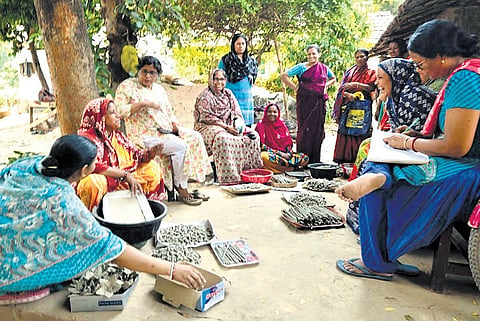Shaping imaginations one clay pinch at a time
Dolon Kundu Mondal was three years old when she would play with mud on the banks of the Atrai River in the heart of West Bengal. Her deft fingers would shape the clay into small figurines, which when dried would be her toys. “This is how I picked up pottery. It intrigued me. Growing up, I began experimenting with clay, trying different ways to create pieces that are both unique and sturdy,” says the 48-year-old potter, who divides her time between Burdwan and Kolkata.
Constantly experimenting with new techniques to perfect her craft, Mondal chose pinch pottery as her metier. “The delicate art of pinch pottery is a technique by which clay is meticulously shaped by hand without using engraved blocks. The oldest examples are the hand-sculpted terracotta figures unearthed from Mohenjodaro,” explains the self-taught artist. Her terracotta artefacts have intricate designs blending cultural and mythological symbols from rural Bengal with cutting-edge artistry.
Kundu’s journey was marked by trial and error, but each challenge fuelled her creativity. “Hailing from a humble background, I had to figure out how to sell my artefacts so that I could afford to continue my passion. When I was 15, I began by making terracotta utilities and selling them in nearby haats and melas to make ends meet,” she says.
It was at one such fair that her life took an unprecedented turn. Her work caught the eye of the West Bengal Craft Council’s then-secretary, Nandita Palchoudhuri, who invited her to exhibit her products at Park Hotel, Kolkata. There she was proffered the opportunity to showcase her pieces at the Royal Museum of Scotland, in 2001.
Kundu blends traditional terracotta elements with contemporary flair. Inspired by the region’s folklore, nature, and daily life, she uses folk motifs to add a unique and authentic touch to her creations. Her pieces feature floral patterns, tribal symbols, mythical creatures, and Gods and Goddesses of the Hindu pantheon—each telling a story rooted in Bengali cultural milieu.
Recognising the need to both preserve and propagate the disappearing art form of pinch pottery, she has dedicated herself to teaching young women in her community, offering them both skills and a path to economic independence. “Teaching is my passion. At the age of 10, when I was still learning and experimenting, I began to teach the process to small children in my neighbourhood.
I have taught around 1,500 women till now. About 250 of them actively work in my studio in Kolkata,” expresses the National-awardee, adding, “If I could change my life through art, I believe it is my responsibility to help others in similar situations to create an identity of their own.”
Her dedication to mentoring and community building has helped many women to find new purpose and confidence. “I believe in the potential of art to empower and inspire. I find joy in helping others discover their creative abilities. My workshops and classes are not just about terracotta but about cultivating a sense of community, confidence, and self-expression among young minds,” states Kundu. It is not just the elephant figure she is working on then, she is moulding lives too.

